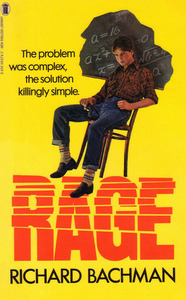Take a photo of a barcode or cover
dark
reflective
tense
medium-paced
Plot or Character Driven:
Character
Strong character development:
No
Loveable characters:
Complicated
Diverse cast of characters:
No
Flaws of characters a main focus:
Yes
Oscillating between a 2.5 and a 3; to me this seemed like a sinister retelling of 'Catcher In The Rye'. The writing was unpolished and had a staggering amount of typos, plus, it wasn't as gripping or horrifying as King's stories would be in the following years. Although, the final moments were pretty tense, and it managed to leave me with a good feeling (that is, despair).
An aspect prominent in his later writings that could already be seen here, however, is an ensemble cast consistent of tropey characters. Not that this is necessarily a bad thing, but in this case, it definitely reads like the author thought up a personality trait or kink and built a whole character off of that, with every single one. Since this is such a short novel with a fairly large cast, this comes off as an issue, making the characters fall flat.
I have to admit the book shines in how convincing the class' discourse can be. The themes of societal norms and violence are discussed against the backdrop of a school shooting that is both cause and effect. I appreciate King's habit of bringing debate to the novel thorugh children or teen characters. They are somehow more convincing; it's easier for us readers to take their message seriously...
An aspect prominent in his later writings that could already be seen here, however, is an ensemble cast consistent of tropey characters. Not that this is necessarily a bad thing, but in this case, it definitely reads like the author thought up a personality trait or kink and built a whole character off of that, with every single one. Since this is such a short novel with a fairly large cast, this comes off as an issue, making the characters fall flat.
I have to admit the book shines in how convincing the class' discourse can be. The themes of societal norms and violence are discussed against the backdrop of a school shooting that is both cause and effect. I appreciate King's habit of bringing debate to the novel thorugh children or teen characters. They are somehow more convincing; it's easier for us readers to take their message seriously...
saying that charles decker’s actions are perfectly justifiable speaks more about my own mental state than anything else.
dark
emotional
sad
tense
medium-paced
Plot or Character Driven:
Character
Strong character development:
Complicated
Loveable characters:
No
Diverse cast of characters:
No
Flaws of characters a main focus:
Yes
Disturbing
This was ok. I just didn't have anything that grabbed my attention.
Un entrée dans la tête d’un adolescent humilié, harcelé, tabassé, qui décide de ce venger et tue deux professeurs de son école, un récit poignant avec de belles scènes marquantes et un huis-clos prenant !
No me terminó de atrapar la historia. Me pareció que podía llegar a ser un libro interesante pero, aunque por momentos es entretenido y aborda temas complejos como la violencia en los jóvenes y la salud mental de tal manera que te lleva a entender que el personaje de Charlie es probablemente más que un loco suelto, tiene varias subtramas innecesarias para la historia principal que además no llegan a ningún lado al final del libro. Es lo primero que leo de Stephen King así que me gustaría darle una oportunidad a sus obras más reconocidas.
This is likely the worst, most pointless book by Stephen King that I have ever read. Granted, he wrote this book as a teenager and was likely only published under a pseudonym because he became famous later on. Otherwise, I see zero literary value in this angry, nonsensical farce written by a younger Stephen King.
The thing is, the Bachman books have always been rougher around the edges, and the stories are almost always about the worst sides of humanity. The Long Walk is about greed and how far we are willing to go to satiate that hunger; The Running Man is a commentary on how far we are willing to go for the sake of mass media entertainment. Rage, on the other hand, isn't about anything at all. It is a school shooting that turns into some kind of group therapy session, and in some ways it almost justifies the main antagonist's actions. I think it is wise that King allowed this book to go out of print. It doesn't sit well in his bibliography, and certainly not on bookshelves, especially considering today's climate.
Every author has bad books, and King has his fair share. However, his bad books are almost always bad because they are too long or the ending is shit (sometimes both). However, Rage is neither of those things. It's just 120 odd pages of a very badly written story that doesn't mean anything at the end of it all. It is a waste of time and, if you are looking to read all of his works, I recommend skipping this one.
The thing is, the Bachman books have always been rougher around the edges, and the stories are almost always about the worst sides of humanity. The Long Walk is about greed and how far we are willing to go to satiate that hunger; The Running Man is a commentary on how far we are willing to go for the sake of mass media entertainment. Rage, on the other hand, isn't about anything at all. It is a school shooting that turns into some kind of group therapy session, and in some ways it almost justifies the main antagonist's actions. I think it is wise that King allowed this book to go out of print. It doesn't sit well in his bibliography, and certainly not on bookshelves, especially considering today's climate.
Every author has bad books, and King has his fair share. However, his bad books are almost always bad because they are too long or the ending is shit (sometimes both). However, Rage is neither of those things. It's just 120 odd pages of a very badly written story that doesn't mean anything at the end of it all. It is a waste of time and, if you are looking to read all of his works, I recommend skipping this one.
dark
reflective
sad
medium-paced
Plot or Character Driven:
Character
Strong character development:
No
Loveable characters:
No
Diverse cast of characters:
No
Flaws of characters a main focus:
Yes
Charlie Decker has a unique voice, a fucked-up sense of humor, and the sort of psychology that makes it debatable as to whether or not he’s an unreliable narrator. Charlie is a character who finds joy in toying with others and being in control. This is demonstrated in how he harasses and picks on the adults outside of the classroom and how he turns his peers against Ted Jones in a vicious act of mob mentality.
The raw nature of Charlie’s narrative and the stream of consciousness, matter-of fact-way he presents his thoughts and justification for things he does can easily inspire disgust in some readers while others may find it blunt and boorish in nature. Charlie seems to have the same thoughts of semi active nihilism you’d find in most jaded, troubled teenagers. His cavalier attitude and dismissal about the severity of the nature of events around him is morbidly humorous – so much so, you’d be forgiven if you, as the reader, were to laugh along with Charlie in certain moments.
The central theme to Charlie’s character is his rage. The abuse at the hands of his father while he was growing up and the subsequent dismissal of his issues and problems as they are waved off by other adults in his life while he was growing up, have turned Charlie into what he is by the opening of the story. Charlie is an intelligent character, but so too he is dangerous. He is borderline sociopathic, but he is also charismatic enough that he presents himself as relatable to the reader and his classmates with all the care and intent that Bachman (King) writes him to be. Just as his classmates identify with Charlie and are sucked up into his pseudo group therapy session, so too, do you become entranced, as the reader of the story, feeling as though you are one of the students in the room.
In all this madness, even the reader may see Ted Jones as the unreasonable voice in the mix. Ted is the one who is objectively against Charlie, just like the faculty and cops outside of the school. Charlie, though not entirely an outcast, has not been traditionally accepted by his peers (or so it would seem from the brief context we get in flashbacks and recollections told). Ted, though, is the perfect all-American boy.
In Charlie’s constructed world, he’s in charge and Ted is now the odd one out. Ted won’t conform to the group psychology of the classroom, and this makes him an enemy of Charlie. This makes Ted Charlie’s number one opponent in the eyes of Charlie. In Charlie’s constructed world, he’s the priest and the classroom is the confessional. Ted is a sinner, just as they are all sinners, but Ted still refuses to come to Church, to come to confession, so its up to Charlie’s new congregation to make sure Ted repents.
By the end of the novella, Ted is in a battered, catatonic state and is hospitalized due to the physical damage being so great. Charlie is in a mental institution by reason of insanity for the crime he committed, stating he “is slowly feeling like a person again.” Though, it’s truly questionable as to whether Charlie regrets what he did, and highly ironic that he feels inhuman when he is responsible for stripping Ted’s humanity from him. With Ted and Charlie both being placed in hospitalization, it has almost brought them to the same social, circumstantial, and situational level. In the end, Charlie didn’t end up any better off than Ted. Though I don’t suspect Charlie is insane and that Charlie even sees himself on the same level as Ted. Charlie seems incapable of understanding the scope and impact the consequences of his actions have had.
For a novella that is nearly 50 years old at the time of this review’s writing, it is nothing short of stunning and a cultural reflection as to how relevant this book remains. I’m not simply referring to gun violence and school shootings, though it would be unjust to not make note of that and to not refer readers to Stephen King’s 2013 Kindle Singles essay “Guns.” A writing by Mr. King against gun violence and why gun safety is so important. The other reason this story remains so relevant is the accurate portrayal of teenagers and social dynamics in high school. Strip away modern technology and at its core, you get similar conventions to the students and their behaviors and confessions in “Rage” sans the harrowing hostage situation. It’s also an all too accurate reflection of group mentality effortlessly rendered by tensions of a heightened circumstance.
The raw nature of Charlie’s narrative and the stream of consciousness, matter-of fact-way he presents his thoughts and justification for things he does can easily inspire disgust in some readers while others may find it blunt and boorish in nature. Charlie seems to have the same thoughts of semi active nihilism you’d find in most jaded, troubled teenagers. His cavalier attitude and dismissal about the severity of the nature of events around him is morbidly humorous – so much so, you’d be forgiven if you, as the reader, were to laugh along with Charlie in certain moments.
The central theme to Charlie’s character is his rage. The abuse at the hands of his father while he was growing up and the subsequent dismissal of his issues and problems as they are waved off by other adults in his life while he was growing up, have turned Charlie into what he is by the opening of the story. Charlie is an intelligent character, but so too he is dangerous. He is borderline sociopathic, but he is also charismatic enough that he presents himself as relatable to the reader and his classmates with all the care and intent that Bachman (King) writes him to be. Just as his classmates identify with Charlie and are sucked up into his pseudo group therapy session, so too, do you become entranced, as the reader of the story, feeling as though you are one of the students in the room.
In all this madness, even the reader may see Ted Jones as the unreasonable voice in the mix. Ted is the one who is objectively against Charlie, just like the faculty and cops outside of the school. Charlie, though not entirely an outcast, has not been traditionally accepted by his peers (or so it would seem from the brief context we get in flashbacks and recollections told). Ted, though, is the perfect all-American boy.
In Charlie’s constructed world, he’s in charge and Ted is now the odd one out. Ted won’t conform to the group psychology of the classroom, and this makes him an enemy of Charlie. This makes Ted Charlie’s number one opponent in the eyes of Charlie. In Charlie’s constructed world, he’s the priest and the classroom is the confessional. Ted is a sinner, just as they are all sinners, but Ted still refuses to come to Church, to come to confession, so its up to Charlie’s new congregation to make sure Ted repents.
By the end of the novella, Ted is in a battered, catatonic state and is hospitalized due to the physical damage being so great. Charlie is in a mental institution by reason of insanity for the crime he committed, stating he “is slowly feeling like a person again.” Though, it’s truly questionable as to whether Charlie regrets what he did, and highly ironic that he feels inhuman when he is responsible for stripping Ted’s humanity from him. With Ted and Charlie both being placed in hospitalization, it has almost brought them to the same social, circumstantial, and situational level. In the end, Charlie didn’t end up any better off than Ted. Though I don’t suspect Charlie is insane and that Charlie even sees himself on the same level as Ted. Charlie seems incapable of understanding the scope and impact the consequences of his actions have had.
For a novella that is nearly 50 years old at the time of this review’s writing, it is nothing short of stunning and a cultural reflection as to how relevant this book remains. I’m not simply referring to gun violence and school shootings, though it would be unjust to not make note of that and to not refer readers to Stephen King’s 2013 Kindle Singles essay “Guns.” A writing by Mr. King against gun violence and why gun safety is so important. The other reason this story remains so relevant is the accurate portrayal of teenagers and social dynamics in high school. Strip away modern technology and at its core, you get similar conventions to the students and their behaviors and confessions in “Rage” sans the harrowing hostage situation. It’s also an all too accurate reflection of group mentality effortlessly rendered by tensions of a heightened circumstance.






